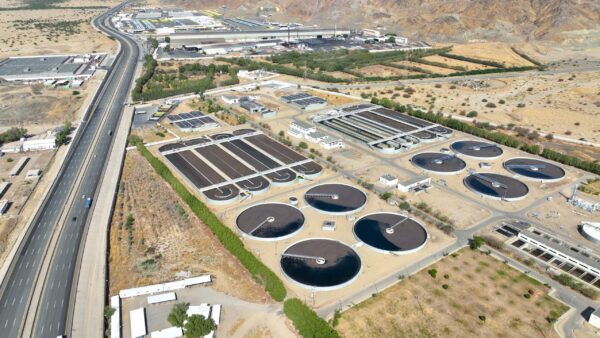

The prolonged period of low oil prices has certainly taken a toll on the ability of Middle East nations to roll out new projects. But for Hill International, a global project management and construction claims consulting firm, the impact to the company’s business was much less significant than one would expect.
“While there has been some downsizing [in terms of project activities] and postponements of expected projects, overall, the impact was not as severe as one would have thought,” said Hill’s Chief Operating Officer, Raouf Ghali. “The projects we are working on are multi-year mega projects for which investments have been committed for the next 20 to 30 years. And we were able to secure the Lusail LRT project [in Qatar] and are also at the last stages of several assignments that have a construction value of about $5 billion that are likely to provide more than $150 million in fees for us in the Middle East.” In mid-May, Hill announced its joint venture with Italferr of Italy and ASTAD Engineering Consultancy and Project Management Company which was awarded a contract by Qatar Railways Company to provide project management consultancy services for the Lusail Light Rail Transit (LLRT) system near Doha, Qatar. The four-year contract has an estimated value to the joint venture of nearly $42 million. Hill is a 50% partner in the joint venture. Lusail City, just north of Doha, is a visionary waterfront development currently under construction. Designed to be an environmental and self-sustaining community, the city will have residential and commercial developments, including schools, medical facilities, shopping centers, and more. In line with the vision of Lusail City, the LLRT network will serve residents of the city by providing an environmentally-friendly mode of transportation that will not only connect destinations within Lusail, but also to Doha by way of the Doha Metro. The 38.5-kilometer (23.5-mile) tram system will have four lines, 25 stations at-grade and seven underground stations.
Hill has already mobilized staff for the LLRT and has boots on the ground, said Samer Tamimi, the company’s senior vice president in Abu Dhabi, adding that to the west in Riyadh, Saudi Arabia, Hill International is also forging ahead with its contract for the Riyadh Metro project. “Tunnel boring is progressing very well. Our biggest milestone will be completion of tunnelling for Line 5 and the entire section by the end of May,” Tamimi said. With a price tag of nearly $28 billion, the Riyadh Metro project is strongly underpinned with support by the government of Saudi Arabia that has also guaranteed the funding. Hill is providing project and construction management services for the mega project and will oversee the design and construction deliverables through the project life cycle for Package 3, which consists of Lines 4, 5 and 6 spread over a total of 67 kms (42 miles) of track. “The decrease in low oil prices has not had a negative impact on the Riyadh metro project,” Tamimi said. Like any commodities that go through a cycle of upward and downward prices, crude oil is also not an exception. However, Hill has been successful in mitigating its impact in the Middle East.
“Globally, impacts have been felt in the U.S. where large oil and gas investments have slowed down tremendously,” Ghali said. However, investments in the infrastructure sector in the U.S. remains robust and remains one of Hill’s strongest sectors that continue to grow each year, he said. Ghali’s statements came in the wake of West Texas Intermediate (WTI) prices dipping from about $90 per barrel in October 2014 to a low of about $28 per barrel in January this year. The impact was also seen in the CIS countries, and in particular in Kazakhstan and Azerbaijan, that depend on oil as the principal source of revenue, said Serdar Gucar, senior vice president and managing director of Turkey for Hill International. Although Hill has major projects in hand, like Expo 2017 and the St Regis hotel developments, reduced revenues from low oil prices will likely impact planned investments in major infrastructure, educational, healthcare, tourism, hospitality and real estate projects in Kazakhstan and Azerbaijan.
Oil price rebound
Oil prices have had a volatile startthis year, the Qatar National Bank said in a report on May 22. They collapsed to $28 per barrel in the first 20 days of 2016, but then rebounded strongly and are now up 33% year to date at $49 per barrel, with analysis suggesting demand factors have been entirely responsible for the rebound in oil prices, offsetting supply increases. “An improvement in risk appetite since late January has boosted the outlook for global growth and oil demand and lent strong support to oil prices. This means that our forecast for strong demand growth this year remains intact, which should support oil prices,” the QNB report said, forecasting an average WTI price of $41 per barrel for the remaining months of 2016 and rising to $51 per barrel in 2017. “With oil prices slowly showing signs of a recovery, our impression is that it will take a lot longer than just a few months for an uptick in general project activity in the Middle East. It’s not an elastic environment,” Ghali said. “In the U.S., there is a much better feel in the industry that if prices continue to rise, things will come back. But nothing has started yet and we are waiting,” he said.
While producers, developers, bankers, statisticians and book keepers are waiting keenly on what would be the final outcome, the world’s largest oil producing nation of Saudi Arabia has in the meanwhile unveiled a major program aimed at developing its non-oil resources. Called Vision 2030, the kingdom’s focus will be on three major elements: promotion of human resources, infrastructure development and integration among all economic players. Details on the plan are still awaited, but Reuters news agency reported in late April that Vision 2030 envisaged raising non-oil revenue to $160 billion by 2020 and $267 billion by 2030, compared with $44 billion last year. “This will impact Hill in a positive way, as major investments will be planned in the infrastructure sector that will include developing a hub for the transit of cargo, transmodal shipments on road, rail and ships and also investments in the hospitality and tourism sectors,” Ghali said. All these are areas of specialization and expertise for Hill International and the expectation will be for the company to pursue opportunities for new projects in theKingdom.
In the last oil price downturn of 2008/09, when WTI prices fell from a record high of $143 per barrel to nearly $43 per barrel, the impact on business in the Middle East – including Hill International – was felt in a more pronounced manner. At that time, a majority of the company’s contracts were related to real estate, hotel leisure, tourism and housing projects. However, this time around with the company implementing more infrastructure development projects that are guaranteed long-term investments by the government, the impact has been felt much less.
By Ashok Dutta
Share

June 23, 2025 | Articles
Jeffrey Hurley Joins Hill’s Northern California Rail Practice

June 23, 2025 | Articles
Ready, Set, Grow: First VP Chad Koelling Takes Charge of Hill’s Mountain West Region

June 8, 2025 | Articles
PMO in Saudi Arabia: The Holistic Approach to Realizing a National Mega-Portfolio

June 1, 2025 | Articles

May 26, 2025 | Articles

May 12, 2025 | Articles
Keeping Your Water/Wastewater Programs Flowing with Public Relations

April 27, 2025 | Articles
Oiling the Machine: Steps to Successful Permitting on Infrastructure Megaprojects

April 20, 2025 | Articles
Sustainable Scaling: Solutions for Managing Risk on Europe’s Data Center Projects